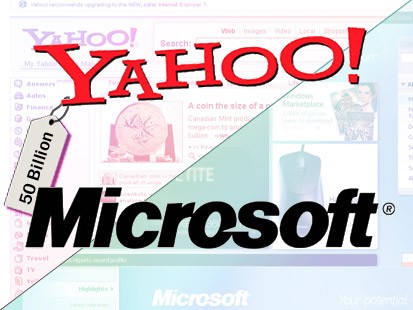By now everyone has heard the news announced this morning that Microsoft has offered to buy Yahoo! for $44 billion. Is this earth-shattering, or something that should have been expected given the current disarray at Yahoo! and Microsoft’s distant 3rd (domestically, 4th globally) in the search race?

Either way, the FTC will face the same objections that were leveled against Google/DoubleClick, and likely from the same sources.
And just like the Google/DoubleClick merger, many of the arguments won’t be about competition, but instead will focus on privacy. One would think that with the Google/DoubleClick approval now serving as precedent, the FTC will be able to dismiss these arguments as non-jurisdictional a bit more easily. But, being that the deal is still pending in the EU and that several groups are challenging the approval in the US, Microhoo! isn’t out of the woods yet.
EPIC will also have to come up with another clever logo like this one:

My suggestion: just change the punctuation. Privacy!
Though privacy is certainly a valid concern, a question remains for privacy advocates: Who can merge? Anyone competing in the search market who desires to compete with Google is likely going to do so with at least a few acquisitions and along with the hardware, patent portfolios, and a bunch of PhDs–these search market contenders will also be combing their data. But is this reason enough to oppose such mergers? Not if we want the market to stay competitive.
Blocking mergers of search companies blocks one of the most effective methods for any group of competitors to take on Google. Without the ability to acquire or merge with other firms, organic growth is the only method left to these companies to try to catch Google, making the search race much harder to run.
But would the deal be good for consumers? There’s reason to think so. Yahoo! and Microsoft could combine their online services to compete much better with Google. A few possibilities:
1.) Turn Microsoft’s Photosynth loose on Flickr and add tags to everyone’s photos using picture recognition software. This will enrich the database immeasurably. Imagine your pictures from the Louvre suddenly being tagged with the title of the work, the name of the artist, and the year the work was created.
2.) Use Microsoft’s Live Search Images software with Flickr to create filters for faces, portraits, and black and white photos.
3.) Give every MSN and Windows Live user the ability to create custom RSS feeds using Yahoo! Pipes technology.
The potential for much better targeting also exists especially given the purchases of aQuantive and Right Media by Microsoft and Yahoo! respectively. In addition, Microhoo! could benefit from sheer economies of scale. Both of these factors mean Microhoo! could cut its margins and offer ad buyers lower rates and ad sellers higher pay-outs. The result: online content creators will have more coin in their pocket to spend on content, benefiting everyone.


 Congressman Ed Markey (D-Mass) has introduced legislation aimed at ridding the cell phone world of the much criticized practicies of phone subsidies, long-term contracts, and termination fees. In the name of contract “consistency” Markey’s bill mandates that cell companies offer alternative plans that contain no subsidy for the handset and plans that offer month-to-month service.
Congressman Ed Markey (D-Mass) has introduced legislation aimed at ridding the cell phone world of the much criticized practicies of phone subsidies, long-term contracts, and termination fees. In the name of contract “consistency” Markey’s bill mandates that cell companies offer alternative plans that contain no subsidy for the handset and plans that offer month-to-month service. When reading an interesting
When reading an interesting 







 The Technology Liberation Front is the tech policy blog dedicated to keeping politicians' hands off the 'net and everything else related to technology.
The Technology Liberation Front is the tech policy blog dedicated to keeping politicians' hands off the 'net and everything else related to technology.